- Forum
- categories
- Sanitation systems
- Shared toilets, community toilets, public toilets
- Public toilets in India
- Ecological Public Toilets for India? Is it possible? (Non-flush-resource-recovery)
Ecological Public Toilets for India? Is it possible? (Non-flush-resource-recovery)
31.3k views
- scopeagency
-
Less
- Posts: 1
- Likes received: 2
Re: ECOSAN TOILET QUESTION AND ANSWER
Dear sir,
Please find the attachment . We have answered all your questions for ECOSAN toilet.
Thanking you with kind regards
Yours Sincerely
M.Subburaman
Director, SCOPE 40
Trichy
Website: www.scopetrichy.com
+++++++++
Comment by moderator: Content of the attachment is copied below (but to see the pictures, you need to open the attachment):
1. What is the incinerator for?
The photographs show the sanitary napkin incinerator installed in the toilet complex. In the absence of a sanitary napkin incinerator many women toilet users put their used napkins inside the compost chamber. This is very bad practice since, when we take out the compost positions of the napkins may be in the compost chamber. So we have installed a sanitary napkin incinerator which will be used by women to dispose of their used napkins. This will prevent any inhibition on the part of farmers or others taking out the compost for reuse.
2. What are the costs for the construction?
Two models of SNI are available. 1. Prefabricated working on electricity. 2. Manually constructed incinerator with bricks where the used napkins are burnt.
The cost of the electrically operated incinerator ranges from Rs. 10,000 to Rs. 45000 depending on the number of users.
• The cost of a manually constructed incinerator will be about Rs. 5000 to Rs. 20,000
During our experience we have found that electrically operated SNIs is not used properly by the clients the SNI develops electrical drouble it becomes un usable. But the manually operated SNIs are very simple to operate and long lastic.
3. How do you store the urine? And how is the process to get it to the farmers?
• Individual ECOSAN toilet
Urine from the UDDTs, is collected in jerricans and brought by vehicle to the Urine Bank in the farm. Apart from promoting direct use of urine in agriculture, urine collected will also be converted into struvite and packed into packets or bags. They where applied for experimental basis for paddy and horticultural products with very good results.
• The urine from the ECOSAN community toilet is collected in a air type sump. The same is transported to the farm in the vehicle.
4. On the photos it looks like that the compost from a few chambers has more ash inside than others, which have a darker color. Is that just a misperception from the photos or can you explain the difference? I assume that a different social group, use different toilets, is that correct?
- With regard to the above question it is misperception from the photographs due to light difference.
- The compost after a few months will change is color to black.
- Irrespective of the social divisions all users use the toilet which is available there is no caste distinction inside the toilet complex
5. What do these cards hold up by the children mean?
To promote usage of ecosan toilets and to make the people understand the benefit of urine and compost from feaces a card was given to all user families. The cards mentioned the dates and as soon as the user entered in the toilet complex a sort of usage was marked in the Colum provided. At the end of the month the card holder was given a small amount for using the toilet. The principle was that he had contributed his urine and feaces to the toilet. This urine and the feacal based compost was precious for use in farms. Hence, a reward was given to him for having promoted ECOSAN toilet. All the children in the photographs are showing their ECOSAN toilet usage cards.( Give shit and get money)
Please find the attachment . We have answered all your questions for ECOSAN toilet.
This attachment is hidden for guests.
Please log in or register to see it.
Please log in or register to see it.
Thanking you with kind regards
Yours Sincerely
M.Subburaman
Director, SCOPE 40
Trichy
Website: www.scopetrichy.com
+++++++++
Comment by moderator: Content of the attachment is copied below (but to see the pictures, you need to open the attachment):
1. What is the incinerator for?
The photographs show the sanitary napkin incinerator installed in the toilet complex. In the absence of a sanitary napkin incinerator many women toilet users put their used napkins inside the compost chamber. This is very bad practice since, when we take out the compost positions of the napkins may be in the compost chamber. So we have installed a sanitary napkin incinerator which will be used by women to dispose of their used napkins. This will prevent any inhibition on the part of farmers or others taking out the compost for reuse.
2. What are the costs for the construction?
Two models of SNI are available. 1. Prefabricated working on electricity. 2. Manually constructed incinerator with bricks where the used napkins are burnt.
The cost of the electrically operated incinerator ranges from Rs. 10,000 to Rs. 45000 depending on the number of users.
• The cost of a manually constructed incinerator will be about Rs. 5000 to Rs. 20,000
During our experience we have found that electrically operated SNIs is not used properly by the clients the SNI develops electrical drouble it becomes un usable. But the manually operated SNIs are very simple to operate and long lastic.
3. How do you store the urine? And how is the process to get it to the farmers?
• Individual ECOSAN toilet
Urine from the UDDTs, is collected in jerricans and brought by vehicle to the Urine Bank in the farm. Apart from promoting direct use of urine in agriculture, urine collected will also be converted into struvite and packed into packets or bags. They where applied for experimental basis for paddy and horticultural products with very good results.
• The urine from the ECOSAN community toilet is collected in a air type sump. The same is transported to the farm in the vehicle.
4. On the photos it looks like that the compost from a few chambers has more ash inside than others, which have a darker color. Is that just a misperception from the photos or can you explain the difference? I assume that a different social group, use different toilets, is that correct?
- With regard to the above question it is misperception from the photographs due to light difference.
- The compost after a few months will change is color to black.
- Irrespective of the social divisions all users use the toilet which is available there is no caste distinction inside the toilet complex
5. What do these cards hold up by the children mean?
To promote usage of ecosan toilets and to make the people understand the benefit of urine and compost from feaces a card was given to all user families. The cards mentioned the dates and as soon as the user entered in the toilet complex a sort of usage was marked in the Colum provided. At the end of the month the card holder was given a small amount for using the toilet. The principle was that he had contributed his urine and feaces to the toilet. This urine and the feacal based compost was precious for use in farms. Hence, a reward was given to him for having promoted ECOSAN toilet. All the children in the photographs are showing their ECOSAN toilet usage cards.( Give shit and get money)
This message has an attachment file.
Please log in or register to see it.
Please Log in to join the conversation.
You need to login to reply- Kevinkuhn
-
 Topic AuthorLess
Topic AuthorLess- Posts: 30
- Karma: 6
- Likes received: 17
Dear Arno and Dear M.Subburaman,
thanks for posting the photos. It looks interesting and is it good to see the amount of compost you gathered.
I have a few questions on this:
Thank you very much!
Kevin
thanks for posting the photos. It looks interesting and is it good to see the amount of compost you gathered.
I have a few questions on this:
- What is the incinerator for?
- What are the costs for the construction?
- How do you store the urine? And how is the process to get it to the farmers?
- On the photos it looks like that the compost from a few chambers has more ash inside than others, which have a darker color. Is that just a misperception from the photos or can you explain the difference? I assume that different social groups, use different toilets, is that correct?
- What do these cards hold up by the children mean?
Thank you very much!
Kevin
Non-Water Sanitation e.V.
www.nonwatersanitation.de
www.nonwatersanitation.org (english)
EcoToiletten - Rental for public composting toilets for cities and music festivals in Germany
www.ecotoiletten.de
www.nonwatersanitation.de
www.nonwatersanitation.org (english)
EcoToiletten - Rental for public composting toilets for cities and music festivals in Germany
www.ecotoiletten.de
Please Log in to join the conversation.
You need to login to reply- scopeagency
-
Less
- Posts: 1
- Likes received: 2
Re: Forum post
Dear sir,
The ECOSAN Community Compost Toilet (ECCT) in Musiri Town Panchayat is functioning very well. MSTP is maintaining the toilet. 350 users are using the toilet. Many people visited the toilet to know the advantages of the toilet. Recently Ashock Layland officials and the Village leaders are visited the toilet and open the chamber. They appreciated the compost taken my their hands. After one hour spend in the toilet to understand the usage and they interview with the users. Finally they decided to construct the ECOSAN toilet in the house holds and the school in Thiruvallur District through CSR funds. The urine is using for Agriculture purpose. They visited the Horticulture research field at Resource Recovery Park in Musiri.?
Thanking you with kind regards
Yours Sincerely
M.Subburaman Director, SCOPE 40, Ramalinga Nagar West Extension Part II, Woraiyur, Trichy - 620 003. Office: 0431-2774144 Mobile : 9443167190, 9965567190 E-mail: This email address is being protected from spambots. You need JavaScript enabled to view it., This email address is being protected from spambots. You need JavaScript enabled to view it., Website: www.scopetrichy.com
The ECOSAN Community Compost Toilet (ECCT) in Musiri Town Panchayat is functioning very well. MSTP is maintaining the toilet. 350 users are using the toilet. Many people visited the toilet to know the advantages of the toilet. Recently Ashock Layland officials and the Village leaders are visited the toilet and open the chamber. They appreciated the compost taken my their hands. After one hour spend in the toilet to understand the usage and they interview with the users. Finally they decided to construct the ECOSAN toilet in the house holds and the school in Thiruvallur District through CSR funds. The urine is using for Agriculture purpose. They visited the Horticulture research field at Resource Recovery Park in Musiri.?
Thanking you with kind regards
Yours Sincerely
M.Subburaman Director, SCOPE 40, Ramalinga Nagar West Extension Part II, Woraiyur, Trichy - 620 003. Office: 0431-2774144 Mobile : 9443167190, 9965567190 E-mail: This email address is being protected from spambots. You need JavaScript enabled to view it., This email address is being protected from spambots. You need JavaScript enabled to view it., Website: www.scopetrichy.com
Please Log in to join the conversation.
You need to login to reply
Arno Rosemarin PhD
Stockholm Environment Institute
This email address is being protected from spambots. You need JavaScript enabled to view it.
www.sei.org
www.ecosanres.org
Stockholm Environment Institute
This email address is being protected from spambots. You need JavaScript enabled to view it.
www.sei.org
www.ecosanres.org
Attachments:
-
Vaultemptying.JPG (Filesize: 135KB)
-
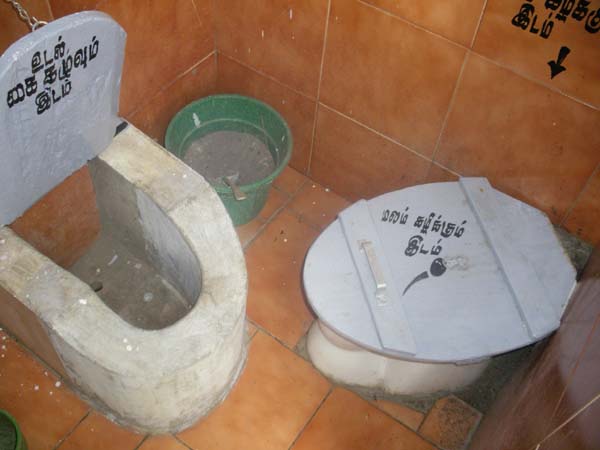 Pedistalur...UDDT.jpg
(Filesize: 44KB)
Pedistalur...UDDT.jpg
(Filesize: 44KB)
-
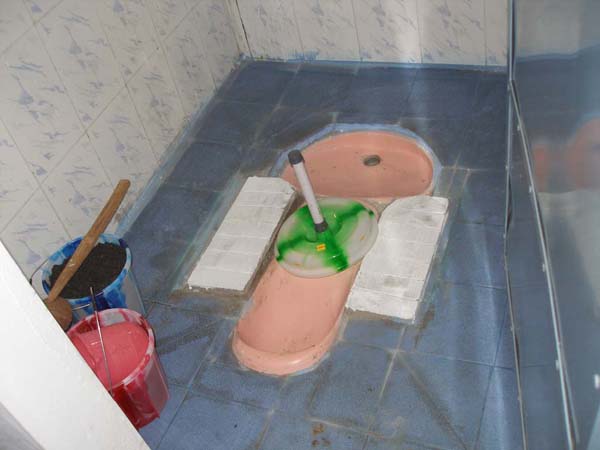 SquatterUDDT.jpg
(Filesize: 39KB)
SquatterUDDT.jpg
(Filesize: 39KB)
-
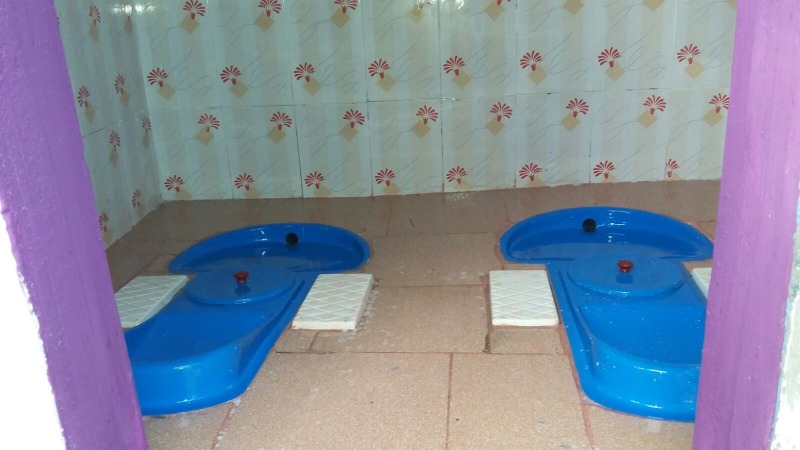 upgradedUD...ters.jpg
(Filesize: 77KB)
upgradedUD...ters.jpg
(Filesize: 77KB)
-
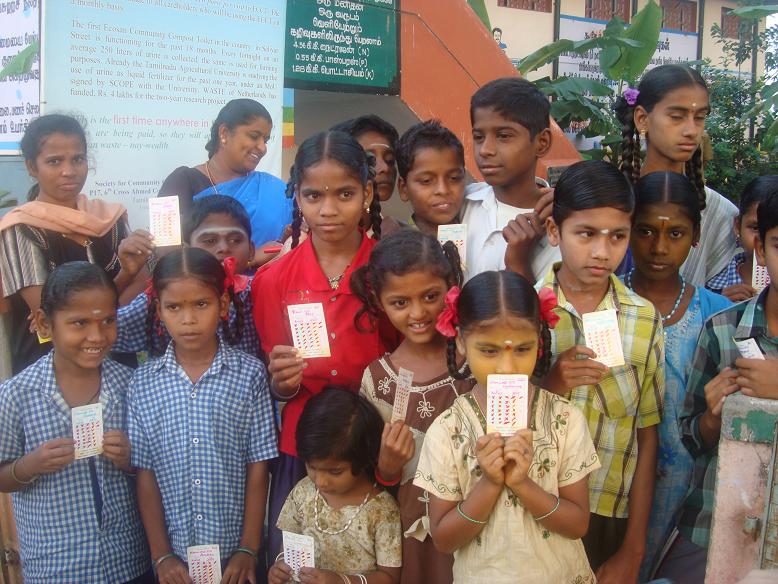 Schoolchil...ning.jpg
(Filesize: 120KB)
Schoolchil...ning.jpg
(Filesize: 120KB)
-
vaultsbein...tied.JPG (Filesize: 207KB)
Please Log in to join the conversation.
You need to login to reply
Here is the material about the Musiri Community UDDT Toilet Center received from M. Subburaman, Director of SCOPE (This email address is being protected from spambots. You need JavaScript enabled to view it.; www.scopetrichy.com). SCOPE built the center with support from WASTE, Netherlands in 2005/2006.
See the attached project description and illustrations. (in two messages)
Regards
See the attached project description and illustrations. (in two messages)
This attachment is hidden for guests.
Please log in or register to see it.
Please log in or register to see it.
This attachment is hidden for guests.
Please log in or register to see it.
Please log in or register to see it.
Regards
Arno Rosemarin PhD
Stockholm Environment Institute
This email address is being protected from spambots. You need JavaScript enabled to view it.
www.sei.org
www.ecosanres.org
Stockholm Environment Institute
This email address is being protected from spambots. You need JavaScript enabled to view it.
www.sei.org
www.ecosanres.org
Attachments:
-
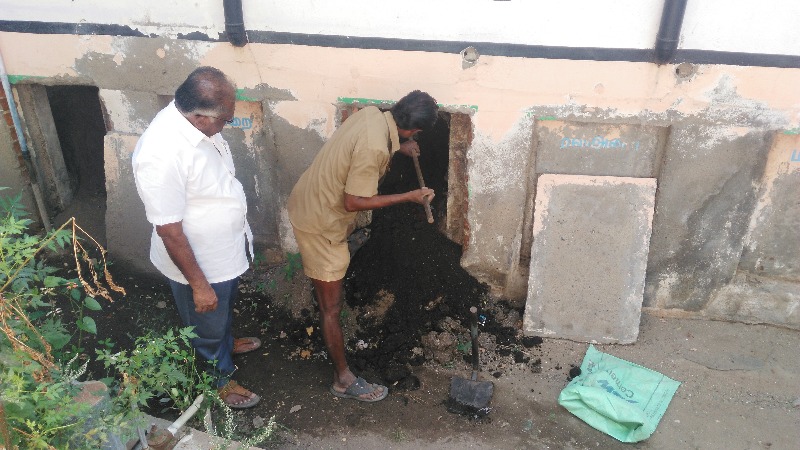 emptyingof...ault.jpg
(Filesize: 158KB)
emptyingof...ault.jpg
(Filesize: 158KB)
-
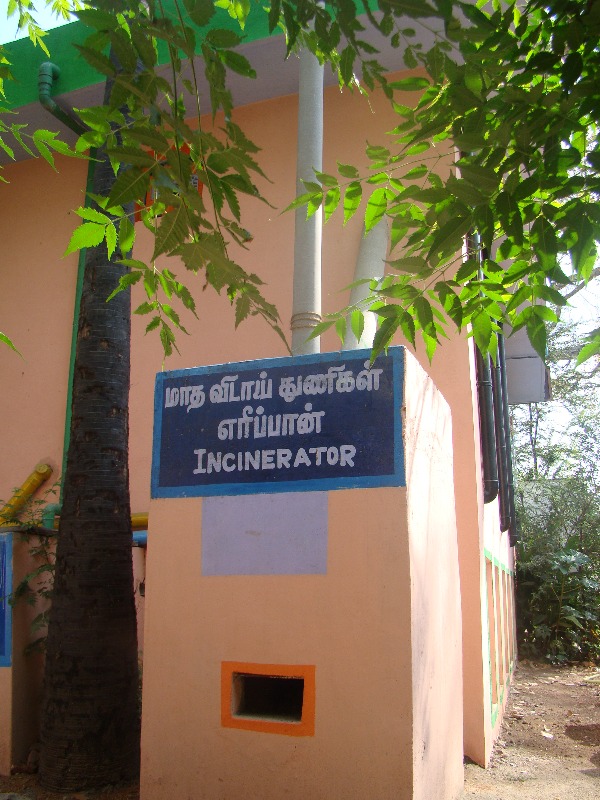 Incinerato...nent.jpg
(Filesize: 195KB)
Incinerato...nent.jpg
(Filesize: 195KB)
-
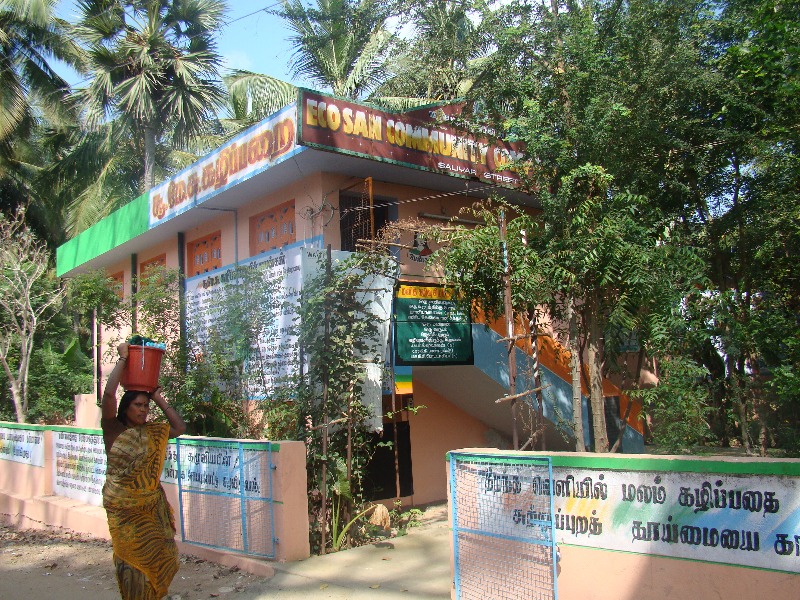 Musiripubl...nter.jpg
(Filesize: 294KB)
Musiripubl...nter.jpg
(Filesize: 294KB)
-
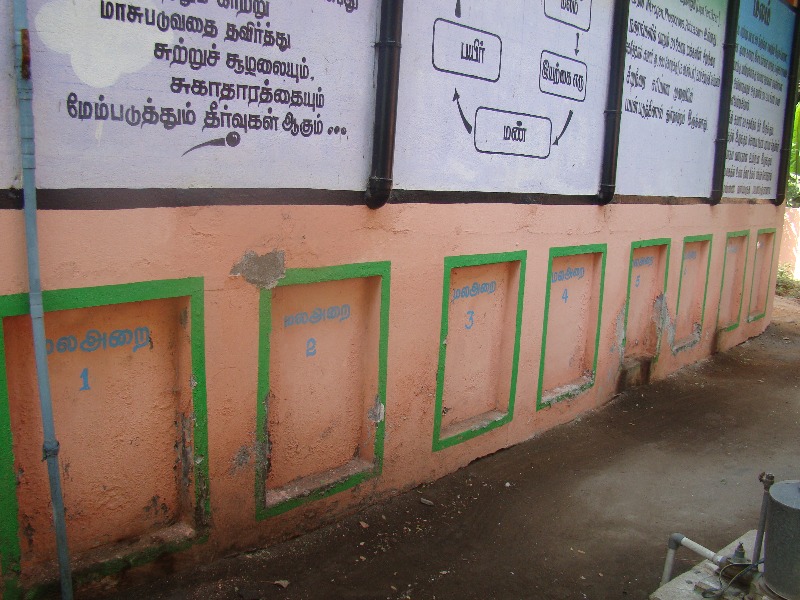 Dryvaultcovers.jpg
(Filesize: 180KB)
Dryvaultcovers.jpg
(Filesize: 180KB)
-
dryvaultsn...tied.JPG (Filesize: 196KB)
Please Log in to join the conversation.
You need to login to reply- Kevinkuhn
-
 Topic AuthorLess
Topic AuthorLess- Posts: 30
- Karma: 6
- Likes received: 17
Hi Elisabeth,
first about the title of the thread. I am not solely interested in urine-separation toilets, but in general in toilets that don´t use water for flushing and focus on resource recovery. Especially in a context of public toilets in cities, I am not 100% sure on which scale a collection of pure urine is manageable and therefore I am looking for ideas on how to handle this issue. So to be more precise the title should perhaps be "Non-flush-resource-recovery public toilet systems in India" But in the end, I am just happy to hear about any system that is not polluting water bodies.
But in the end, I am just happy to hear about any system that is not polluting water bodies.
About my NGO "Non-Water Sanitation". Yes, we are mainly based in Germany, but have a team in India on the ground. We are mainly doing projects in the rural areas of Maharashtra with building UDDTs and doing WASH training. We are now active in Pune for 6 years and established a good reputation and exposure. This led to the contact to the city and to the university as well. The projects are funded by theses institutes and we just jump in as consultants. (Although there is a lot of free-work involved on our side). General funding for the organization is project based, a lot of voluntary work, and a few private donations.
Currently I am designing a system that separates the urine + analcleansing water from the solid matter inside the toilet through a filter. The liquids then get evaporated by solar energy and the overflow will first run into sand-filter and into a plant-based soak pit. I will keep you updated with the system, I am still into the details.
David and I did not have email contact so far. A dedicated thread for Sanitation First is a good idea. *
Best
Kevin
* Note by moderator: the separate thread about the UDDTs by Sanitation First is now available here:
forum.susana.org/170-shared-toilets-comm...nitation-first#24438
first about the title of the thread. I am not solely interested in urine-separation toilets, but in general in toilets that don´t use water for flushing and focus on resource recovery. Especially in a context of public toilets in cities, I am not 100% sure on which scale a collection of pure urine is manageable and therefore I am looking for ideas on how to handle this issue. So to be more precise the title should perhaps be "Non-flush-resource-recovery public toilet systems in India"
About my NGO "Non-Water Sanitation". Yes, we are mainly based in Germany, but have a team in India on the ground. We are mainly doing projects in the rural areas of Maharashtra with building UDDTs and doing WASH training. We are now active in Pune for 6 years and established a good reputation and exposure. This led to the contact to the city and to the university as well. The projects are funded by theses institutes and we just jump in as consultants. (Although there is a lot of free-work involved on our side). General funding for the organization is project based, a lot of voluntary work, and a few private donations.
Currently I am designing a system that separates the urine + analcleansing water from the solid matter inside the toilet through a filter. The liquids then get evaporated by solar energy and the overflow will first run into sand-filter and into a plant-based soak pit. I will keep you updated with the system, I am still into the details.
David and I did not have email contact so far. A dedicated thread for Sanitation First is a good idea. *
Best
Kevin
* Note by moderator: the separate thread about the UDDTs by Sanitation First is now available here:
forum.susana.org/170-shared-toilets-comm...nitation-first#24438
Non-Water Sanitation e.V.
www.nonwatersanitation.de
www.nonwatersanitation.org (english)
EcoToiletten - Rental for public composting toilets for cities and music festivals in Germany
www.ecotoiletten.de
www.nonwatersanitation.de
www.nonwatersanitation.org (english)
EcoToiletten - Rental for public composting toilets for cities and music festivals in Germany
www.ecotoiletten.de
The following user(s) like this post: Elisabeth
Please Log in to join the conversation.
You need to login to reply- Elisabeth
-
- User is blocked
- Freelance consultant since 2012
Less- Posts: 3372
- Karma: 54
- Likes received: 932
Re: Ecological Public Toilets for India? Is it possible?
Hi Kevin and all,
I am curious to hear from you how you have progressed with your deliberations? Did you dig deeper into any of the companies, products and projects that were pointed out to you?
And you work with a small German NGO, right? How is it funded and how would you fund the project in Pune, including ongoing support (if any)? What kind of relationship would you envision with the city council and why would they require assistance from an NGO in Germany; are funds that tight or are there personal ties somehow? Just curious.
I see that you had some questions to David which he hasn't answered yet. Perhaps he has answered you by e-mail in the meantime? David's work with Sanitation First in India is very interesting. Maybe it would be useful to have a dedicated thread for it where he could reply to questions in one place and not in various topic threads (I haven't checked his website recently - perhaps it gives a lot of answers; I also had some further questions to him about the urinals for girls at schools in India).
Arno you had mentioned an old project by SCOPE in Trichy in Tamil Nadu. You said "Would be interesting if we can get an update.". How would you suggest we could get an update? One option could be to add their project into the SuSanA project database and then contact them and ask for an update. This information could then be added to the project description and therefore be available to others in a central place.
I see so much potential for the SuSanA project database which now has over 450 projects (www.susana.org/en/knowledge-hub/projects/database). But the maintenance work there is not a "popular" activity... Sharing is caring!
Regards,
Elisabeth
P.S. Kevin: I am finding the thread title "ecological public toilets in India" a bit vague. Could we perhaps make it more clear? Are you specifically talking about urine-diversion toilets here? With reuse activities or without?
I am curious to hear from you how you have progressed with your deliberations? Did you dig deeper into any of the companies, products and projects that were pointed out to you?
And you work with a small German NGO, right? How is it funded and how would you fund the project in Pune, including ongoing support (if any)? What kind of relationship would you envision with the city council and why would they require assistance from an NGO in Germany; are funds that tight or are there personal ties somehow? Just curious.
I see that you had some questions to David which he hasn't answered yet. Perhaps he has answered you by e-mail in the meantime? David's work with Sanitation First in India is very interesting. Maybe it would be useful to have a dedicated thread for it where he could reply to questions in one place and not in various topic threads (I haven't checked his website recently - perhaps it gives a lot of answers; I also had some further questions to him about the urinals for girls at schools in India).
Arno you had mentioned an old project by SCOPE in Trichy in Tamil Nadu. You said "Would be interesting if we can get an update.". How would you suggest we could get an update? One option could be to add their project into the SuSanA project database and then contact them and ask for an update. This information could then be added to the project description and therefore be available to others in a central place.
I see so much potential for the SuSanA project database which now has over 450 projects (www.susana.org/en/knowledge-hub/projects/database). But the maintenance work there is not a "popular" activity... Sharing is caring!
Regards,
Elisabeth
P.S. Kevin: I am finding the thread title "ecological public toilets in India" a bit vague. Could we perhaps make it more clear? Are you specifically talking about urine-diversion toilets here? With reuse activities or without?
Dr. Elisabeth von Muench
Freelance consultant on environmental and climate projects
Freelance consultant on environmental and climate projects
Please Log in to join the conversation.
You need to login to reply
Kevin (and others)
Do take contact with the people at SCOPE in Trichy in Tamil Nadu.
www.scopetrichy.com/
Some ten years ago they built a successful block of public toilets in Musiri.
musiri.wordpress.com/category/ecosan-toilets/page/2/
These were UDDT squatters with an additional drain for anal washing. They had full-time maintenance. To my knowledge this facility remains in operation. pibindia.wordpress.com/2016/09/29/musiri...sible-public-toilet/
SCOPE also implemented large scale reuse of urine in the nearby banana plantations.
Musiri was rather special. A town of 30.000 with no planned sanitation system. Would be interesting if we can get an update.
www.thebetterindia.com/78604/ecosan-wate...itation-rural-india/
Regards
Do take contact with the people at SCOPE in Trichy in Tamil Nadu.
www.scopetrichy.com/
Some ten years ago they built a successful block of public toilets in Musiri.
musiri.wordpress.com/category/ecosan-toilets/page/2/
These were UDDT squatters with an additional drain for anal washing. They had full-time maintenance. To my knowledge this facility remains in operation. pibindia.wordpress.com/2016/09/29/musiri...sible-public-toilet/
SCOPE also implemented large scale reuse of urine in the nearby banana plantations.
Musiri was rather special. A town of 30.000 with no planned sanitation system. Would be interesting if we can get an update.
www.thebetterindia.com/78604/ecosan-wate...itation-rural-india/
Regards
Arno Rosemarin PhD
Stockholm Environment Institute
This email address is being protected from spambots. You need JavaScript enabled to view it.
www.sei.org
www.ecosanres.org
Stockholm Environment Institute
This email address is being protected from spambots. You need JavaScript enabled to view it.
www.sei.org
www.ecosanres.org
Attachments:
-
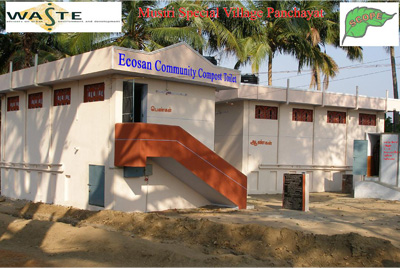 musiri-spe...ayat.jpg
(Filesize: 63KB)
musiri-spe...ayat.jpg
(Filesize: 63KB)
Please Log in to join the conversation.
You need to login to reply- former member
-
Less
- Posts: 101
- Likes received: 3
Re: Ecological Public Toilets for India? Is it possible?
Regarding the use of biological additives
The issue reduces to the relative time scales being considered (system cycle time of a batch system).
The rapidly biodegradable material is not the issue, it does not matter if the material biodegrades within the initial 5 % or 50% of the cycle time of the system; it will degrade. The system accumulates the (relatively) non-biodegradable material. So a meaningful test for any additive is its effectiveness in degrading the oldest material in the system.
++++++++
Note by moderators: This post was made by a former user with the login name ChrisBuckley who is no longer a member of this discussion forum.
The issue reduces to the relative time scales being considered (system cycle time of a batch system).
The rapidly biodegradable material is not the issue, it does not matter if the material biodegrades within the initial 5 % or 50% of the cycle time of the system; it will degrade. The system accumulates the (relatively) non-biodegradable material. So a meaningful test for any additive is its effectiveness in degrading the oldest material in the system.
++++++++
Note by moderators: This post was made by a former user with the login name ChrisBuckley who is no longer a member of this discussion forum.
The following user(s) like this post: goeco, nirupaman09
Please Log in to join the conversation.
You need to login to reply
Hi Kevin,
Thank you for your message.
Please find below answers to your questions:
1) What is that bacterial culture? Why do you need more bacteria, since there is already a lot of bacteria inside the feces.
Our special bacterial culture blend formula treats the waste very fast within 3-4 days only while the bacteria inside the feces might take few months. That means the upper chamber will never be full and no solid waste needs to be removed. The end product is ONLY liquid fertilizer full of nutrients.
2) How can it turn into ashes? Do you have an incineration process inside the toilet?
Our special formula breaks down the waste and eats it up. No incineration process inside the toilet.
3) Do you have some test results and prove that this process is killing all the pathogens? How does this "killing" process work?
Please follow the following link to better understand our system:
www.ecoloogroup.com/impact.html
Please note that ECOLOO is a waterless toilet which means your don't use water for flushing but water can still be used for washing and hygiene purposes using handbidet for example.
Should you have any questions or require further clarifications, kindly revert to us.
Thank you again and all the best!
Thank you for your message.
Please find below answers to your questions:
1) What is that bacterial culture? Why do you need more bacteria, since there is already a lot of bacteria inside the feces.
Our special bacterial culture blend formula treats the waste very fast within 3-4 days only while the bacteria inside the feces might take few months. That means the upper chamber will never be full and no solid waste needs to be removed. The end product is ONLY liquid fertilizer full of nutrients.
2) How can it turn into ashes? Do you have an incineration process inside the toilet?
Our special formula breaks down the waste and eats it up. No incineration process inside the toilet.
3) Do you have some test results and prove that this process is killing all the pathogens? How does this "killing" process work?
Please follow the following link to better understand our system:
www.ecoloogroup.com/impact.html
Please note that ECOLOO is a waterless toilet which means your don't use water for flushing but water can still be used for washing and hygiene purposes using handbidet for example.
Should you have any questions or require further clarifications, kindly revert to us.
Thank you again and all the best!
Best Regards,
Imad Agi
Chairman & CEO, ECOLOO Group
Inventor | Ecopreneur | Speaker
W: www.ecoloogroup.com
FB: www.facebook.com/ecoloogroup
Eco Friendly | Odour Free | Water Free | Sewage Free | Energy Free | Chemical Free
: : Top 10 Global Innovators & Solution Providers on Global Challenges at Solutions Summit 2016 - United Nations Foundation, USA
Imad Agi
Chairman & CEO, ECOLOO Group
Inventor | Ecopreneur | Speaker
W: www.ecoloogroup.com
FB: www.facebook.com/ecoloogroup
Eco Friendly | Odour Free | Water Free | Sewage Free | Energy Free | Chemical Free
: : Top 10 Global Innovators & Solution Providers on Global Challenges at Solutions Summit 2016 - United Nations Foundation, USA
Please Log in to join the conversation.
You need to login to reply- Akshay14
-

- an open book who wants to read.
Less- Posts: 12
- Likes received: 1
hello Kevin,
the idea of water-less toilet might create problems specially when you are planning it for India. and to keep toilets sustain and clean you will have to use water and no other options. here you can build regular toilets and then you can separate solids and liquid coming out through the toilet water can be use for re-flushing purpose and solid as fertilizer. specially in rural areas where drainage's and water supply is the biggest issue.
go through this link to know more about the technology www.aquatron.se/start/
or you can write me on This email address is being protected from spambots. You need JavaScript enabled to view it. for any further info.
also adding PDF file to attachments.
hope this will helps you to solve plenty of your problems and above questions.
thanks,
Akshay from pune.
the idea of water-less toilet might create problems specially when you are planning it for India. and to keep toilets sustain and clean you will have to use water and no other options. here you can build regular toilets and then you can separate solids and liquid coming out through the toilet water can be use for re-flushing purpose and solid as fertilizer. specially in rural areas where drainage's and water supply is the biggest issue.
go through this link to know more about the technology www.aquatron.se/start/
or you can write me on This email address is being protected from spambots. You need JavaScript enabled to view it. for any further info.
also adding PDF file to attachments.
hope this will helps you to solve plenty of your problems and above questions.
thanks,
Akshay from pune.
This attachment is hidden for guests.
Please log in or register to see it.
Please log in or register to see it.
Product Manager/sanitation consultant/
Aquatron Maharashtra
www.aquatron.se
Aquatron Maharashtra
www.aquatron.se
This message has an attachment file.
Please log in or register to see it.
Please Log in to join the conversation.
You need to login to reply
We installed Ecosan toilets at our homestay in Orchha. They work well but are not accepted by the locals because of the need to aim well and the fact that the recipient for excreta is visible. I found an interesting alternative through Susana called the Earth Augur - it requires no electricity, allows separation of urine and has a screw that carries the excreta down a tube in which it mixes with sawdust or ash and produces compost automatically. It was invented in Ecuador and is now being produced in China and imported into India. You may contact these two persons for more details: Chuck Henry <This email address is being protected from spambots. You need JavaScript enabled to view it.> and Mo hit <This email address is being protected from spambots. You need JavaScript enabled to view it.>. Do let me know if it succeeds (This email address is being protected from spambots. You need JavaScript enabled to view it.)
This message has an attachment file.
Please log in or register to see it.
Please Log in to join the conversation.
You need to login to reply
Share this thread:
- Forum
- categories
- Sanitation systems
- Shared toilets, community toilets, public toilets
- Public toilets in India
- Ecological Public Toilets for India? Is it possible? (Non-flush-resource-recovery)
Recently active users. Who else has been active?
Time to create page: 0.499 seconds







